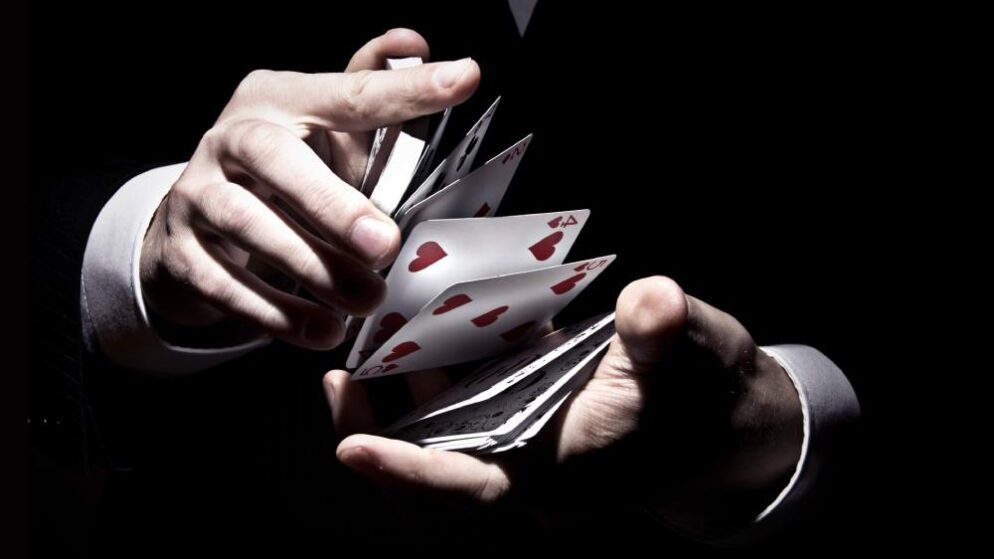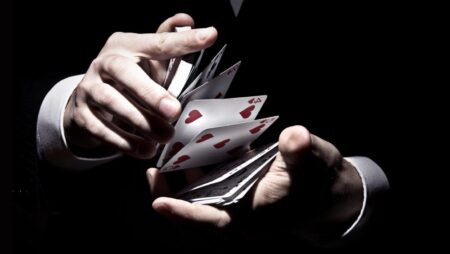



If God started shuffling a deck of cards at the Big Bang or after the Big Bang to get some rest and be entertained, he would never have shuffled them in the same order. This is to say you have never shuffled and dealt a deck of cards in the same order twice. It may be quite hard to believe, but it’s true.
If you play at a casino, you’re not focused on shuffling cards in a specific order but on preventing predictable patterns that could give others an unfair advantage. So, what’s the science behind card shuffling? Can you actually guess your next shuffled deck of cards?
Defining card shuffling
If we are to scientifically define card shuffling, we will say that it is any algorithmic, probabilistic procedure that takes a list of cards as input and applies some steps to modify the order. At its core, card shuffling is an arrangement problem.
Now, there are several methods of card shuffles, and if you’re an avid player, you probably already know or have seen them all. Here are the most common and important types of shuffling:
Riffle Shuffle
Riffle shuffling is the only method of shuffling that leads to a truly mixed deck in a reasonable number of iterations. The riffle shuffle, also known as the dovetail shuffle or shuffle by halves, is also one of the most iconic and visually striking shuffling techniques.
It involves splitting the deck into two roughly equal halves and interleaving the cards together, creating a cascading effect as the cards are riffled together. It is popular not only for its effectiveness in randomising the deck but also for its visual flair, making it a favourite among professional card dealers and magicians.
Overhand Shuffle
The overhand shuffle is another widely used method of shuffling cards, especially in casual settings or when working with a smaller number of cards. In this technique, the shuffler holds the deck in one hand and takes small packets of cards from the top, transferring them to the bottom of the deck.
While less flashy than the riffle shuffle, the overhand shuffle is quick and efficient, making it suitable for less formal games. It is also more difficult to detect than other methods, making it a favourite among those who like to cheat. However, it can be detected by an experienced card player, as the shuffler is likely to make a mistake when shuffling.
Strip Shuffle
The strip shuffle involves dividing the deck into multiple small stacks, usually by pulling off packets of cards from the top and transferring them to the bottom. This technique is often seen in conjunction with other shuffling methods or as a standalone method in games like poker.
Pile Shuffle
Pile shuffling involves physically separating the deck into a number of piles and then recombining them into a single deck. While not as effective at randomising the cards as other techniques, pile shuffling is sometimes used as a preliminary step before more thorough shuffling methods, particularly in games where players want to ensure that certain cards are not clumped together.
Faro Shuffle
The Faro shuffle is a specialised technique primarily used in gambling and card magic. It involves weaving together two halves of the deck by alternately interleaving the cards from each half, creating a perfect interlacing of the cards. When executed perfectly, the Faro shuffle results in every other card from each half being perfectly interlaced with the other, effectively restoring the deck to its original order.
Vegas Wash Shuffle
The wash shuffle, also known as the washing shuffle or the scramble shuffle, is a technique used in a casino at the start of a game when the deck of cards is still in its original order. During the Vegas Wash shuffle, you place the cards face down in two rows and then move them around in circles for at least 5 seconds to mix them up and repeat at least 3 times. Once the cards are “washed,” they’re squared up and are then “riffle shuffled,” often multiple times, before play begins.
In a home game, you should, at the very least, perform a wash at the beginning of the game or whenever the cards have been recently verified. In a game with quick hands and frequent shuffling, like poker, you should skip the wash for most shuffles to avoid bogging down the game.
The Probabilities and Predictability in Card Shuffling
Now, let’s get to the heart of the matter: the probabilities involved in shuffling a deck of cards. One of the most intriguing questions is how many possible arrangements exist for a standard deck of 52 cards. The answer is staggering: a mind-boggling 8.0658175e+67, or roughly 80 unvigintillion! Such is the enormity of the combinatorial possibilities inherent in a deck of cards.
The number of possible permutations in a deck of cards is staggering, contributing to the vast complexity of achieving a truly random shuffle. In reality, there is often a trade-off between the randomness and efficiency of a shuffle. For example, there are easy shuffles that are probably random but would require an infinite number of iterations to produce truly random orderings.
The Probability of the Riffle Shuffle
How many times do you have to riffle a deck of cards before it is completely shuffled? It’s a tricky one, but math has us covered: you need seven riffles. It is possible to guess about 30 cards correctly after one riffle shuffle. On the second riffle, the number drops to 19, followed by 13 after three riffles. The probability of correctly guessing the cards decreases with each shuffle, and after seven riffles, you can no longer predict the cards.
More accomplished card cheats will use false shuffles followed by false cuts to stack the deck to their advantage. During a Texas Hold’em game with 4 other players, a cheat secures two Aces at the top of the deck. Overhand shuffles allow them to move those cards to the 5th and 10th positions in the deck, ensuring they receive Pocket Aces when the cards are dealt.
Overhand shuffles are easier to perform than false riffle shuffles, and they don’t require years of practice to perform undetectable riffle shuffles. False shuffling is also commonly combined with false dealing.
Computerised Shuffling
Gone are the days of manual shuffling dominating the casino floor. While some places still cling to tradition, the rise of advanced playing card technology has ushered in a new era of automation.
In modern card games, especially online platforms, Random Number Generators (RNGs) have become instrumental in simulating the randomness introduced by shuffling algorithms. These algorithms use mathematical formulas to generate sequences of numbers that, in turn, dictate the order of cards in a virtual shuffle, and they are always highly regulated, certified, and monitored.
In live poker settings, shuffling machines are seamlessly integrated into the tabletop, while in online blackjack, they either rest atop the table or operate discreetly off-camera. The era of manual shuffling may be fading, but the thrill of the game remains as electrifying as ever.
Due to their complexity, online cheating attempts rarely exploit shuffling systems. In most cases, hackers attempt to view the cards of other players instead. All gaming companies place a high priority on security for their players. The reputation of every major online or offline game operator depends on it.
It’s time to love the randomness of shuffling
In gaming, randomness is magic. We have all thought about ways to manipulate the game, but in the end, it’s what keeps players coming back for more.
Luck is like the wild card in the deck—sometimes it’s your best buddy, and other times it’s your rival. Embrace both sides and roll with the punches. It’s all part of the fun!
Sign up at EmuCasino and test your skills at a variety of casino games in minutes. Live dealers, new slot games, round-the-clock poker, and amazing promotions are available on a safe and secure platform.










